Weekly Sustainability Series: Moo.
We believe in eating sustainably, but also *really* love meat - specifically beef, and many would argue that those two concepts are diametrically opposed. I've been faced with this dilemma myself for quite some time now - from both a personal and professional standpoint, which is why I was really, really happy to find Les Fermes Valens. This local farming coop is based just South West of Montreal , in the Chateauguay Valley, and sells certified organic products and meats in a wide range of retail stores (full list on their web site) as well as online with home delivery for 10 bucks (free for orders over $175). It's a total no brainer, and shocking that after 8 years in business they are still relatively unknown.
Why do I bother buying pricier, harder to source certified organic meat? There are a couple of good reasons... Organic meat is hormone and antibiotic free, and although the government doesn't seem to think this is better for us, I do. Organic meat is also far leaner, and therefore healthier, and is believed to be higher in nutritional value since the animals are generally healthier. I also find it tastes alot better and prefer the denser texture.
The secondary issues include environmental and animal welfare considerations, which are often interrelated. Sustainably produced beef is free-range and often raised on residential farms which more closely resemble the romanticized vision we all have in our minds of what a farm should be: rolling pastures, where cows graze lazily on green grass. Sure, in the end they meet an ultimate demise which is not very different from their industrially farmed counterparts which spend their lives in densly packed barns and corrals, but the time they spend here on earth is far more pleasant. Sustainable farming is also far less disastrous in terms of environmental impact, since they depend on natural food sources, like grass, and human labour, whereas industrial farms are massive factories, which rely on the consumption of huge quantities of industrially produced and often pesticide laden feed, fuel consuming machines, and they create massive quantities of waste which has to be disposed of somewhere, somehow.
Making the transition to certified meats wasn't hard. We try to consume less meat at home and I introduced more vegetarian options to the Gourmet's menu. By buying more sustainably farmed meat, I support local farmers, and ultimately drive up the demand for the product and encourage more farmers to produce meat using methods that are responsible.
WHAT IT COSTS: The cost of sustainably farmed meats seems higher, because you pay more for less - the first thing you will notice, after the higher sticker price, is that the cuts are smaller and meat is leaner, because organically farmed cows are in better shape, from roaming the fields and eating a natural diet, and they grow at the rate of, well, a normal cow since they are not helped along by growth hormones. But overall, the cost is not higher - because although we pay less at the cash register for industrially farmed beef, we pay far more in the long run in tax dollars required to counteract the medical and environmental costs associated with industrialized farming. As far as the Gourmet's menus goes, I offer customers both options - some dishes are still made with cheaper, factory farmed meats and increasingly, I am building in certified organic dishes, which are a bit pricier.
WHERE TO BUY: Place an order online at www.fermesvalens.com, or pick up their meats at myriad retail stores across Montreal (listed on their website) OR as of May 1st, you'll be able to order pre-marinated, certified organic cuts from our Marinated Meats menu, as well as some frozen sauces and dishes using organic meats. Remember that organic meat is leaner, and therefore needs to be cooked at slightly lower temperatures, for a bit longer. I promise you that you'll find the flavour and texture are both outstanding, and you'll feel better about eating it, and feeding it to your family.









